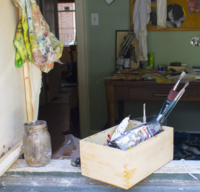 Despite the heat and other distractions in Cambridge this summer, painter Lily Scherlis learns how to develop studio practice.
Despite the heat and other distractions in Cambridge this summer, painter Lily Scherlis learns how to develop studio practice.
by Lily Scherlis '18
2016 Artist Development Fellow
Lily Scherlis ’18, a resident of Dunster House and joint concentrator in Comparative Literature and Visual and Environmental Studies, was awarded an Artist Development Fellowship to explore links between the visual and the textual and between the practice of oil painting and theories of modern media. Scherlis is a staff artist for The Harvard Lampoon and a staff writer for The Harvard Advocate. She studied oil painting at the Aegean Center for the Fine Arts in Paros, Greece in 2013 and was an intern during the summer of 2015 at the Art Farm in Marquette, Nebraska. She plans to continue pursuing art and writing. This is the first of three blog posts about Scherlis's work in Cambridge this summer; click here to read the second.
Someone told me that Harvard’s gardens are seeded exclusively with plants that bloom in April, May, September, and October, which gives you a good idea of what July here feels like. Those of us who stick around try to stay within a meter of a fan at all times and try to expel the stress of the year through our pores.
 It was important to me that my fellowship take place in Cambridge: I didn’t want the distractions of a new location. I wanted to develop a painting practice within the same spaces I would occupy in the fall, and to get over the taboo most Harvard artists seem to have about making work outside of classes during the school year. Most of all I wanted to give myself the breathing room to make work slowly and seriously, unencumbered by the urgency of deadlines and concurrent assignments that leaves my school-year art half-baked.
It was important to me that my fellowship take place in Cambridge: I didn’t want the distractions of a new location. I wanted to develop a painting practice within the same spaces I would occupy in the fall, and to get over the taboo most Harvard artists seem to have about making work outside of classes during the school year. Most of all I wanted to give myself the breathing room to make work slowly and seriously, unencumbered by the urgency of deadlines and concurrent assignments that leaves my school-year art half-baked.
Unfortunately time pressure is endemic to Harvard no matter how far you get from campus. Achievement culture propagates itself like an organism: the spore of self-discipline floats on updrafts around the Cambridge air. It lands in your lungs and takes root. It grows into a lush leafy green thing which, if fertilized with a special mixture of ambition and deadline pressure, can bear an especially tasty kind of fruit (extremely addictive to almost all metazoa). Most people who have ever been exposed to the spore of self-discipline have some degree of chemical dependence on this fruit, which some call “validation.” This poor plant, unfortunately, too often becomes a snack for the parasite perfectionism. That’s why you need the deadline-based fertilizer: deadline pressure is a notorious phagocyte, and can devour perfectionism whole before it even thinks of sprouting.

Now if, like me, this stuff already has you by the alveoli, you have options. You can learn to breathe with it.
My proposal for the fellowship focused on developing a studio practice: creating a space for myself in which to make things, and, in turn, learning to make better things within this space. I immediately interpreted this as going hand in hand with having time to paint and to paint a lot. Dozens of finished canvases are undeniably sexy. But quickly the glossy glamour of just finishing a lot of paintings wore off as I painted and painted over the same canvas dozens of times, deep in the muck of perfectionism. I realized I could make more thorough and long-lasting use of this time. I decided to treat my studio as a laboratory in which to worry not about how much I got done, but as a chance to pinpoint some of these psychic stumbling blocks and get over them. I wanted a good routine that would make self-discipline redundant. (To be continued.)
The Artist Development Fellowship program, jointly administered by the Office for the Arts at Harvard, the Office of Undergraduate Research and Fellowships and Office of Career Services, awards 10-15 fellowships annually to promising and/or accomplished student artists and creators who have an unusual opportunity for artistic growth and transformation. The program is open to all undergraduates currently enrolled in Harvard College, and applications are evaluated by the Council on the Arts, a standing committee of the Faculty of Arts and Sciences. For more information, visit the OFA website or call 617.495.8676.